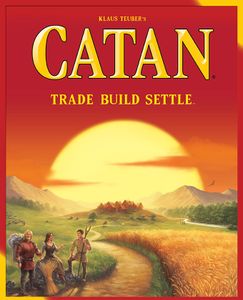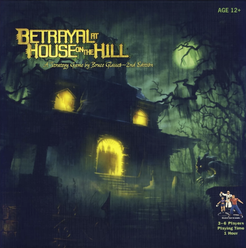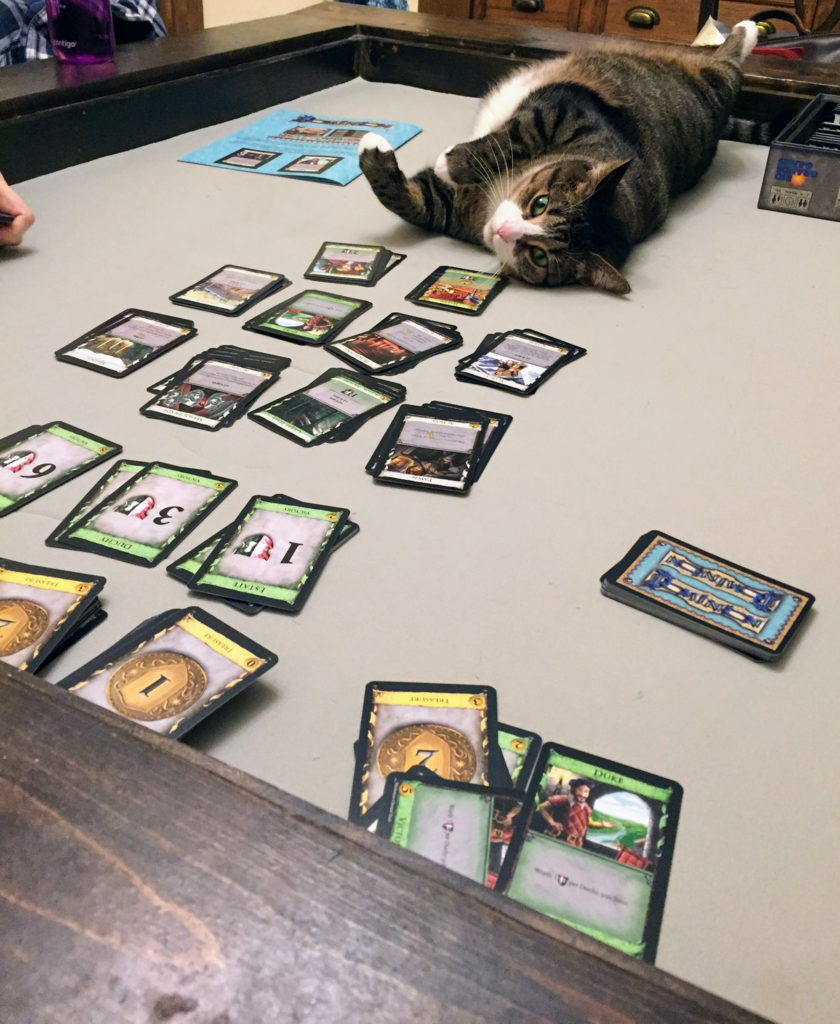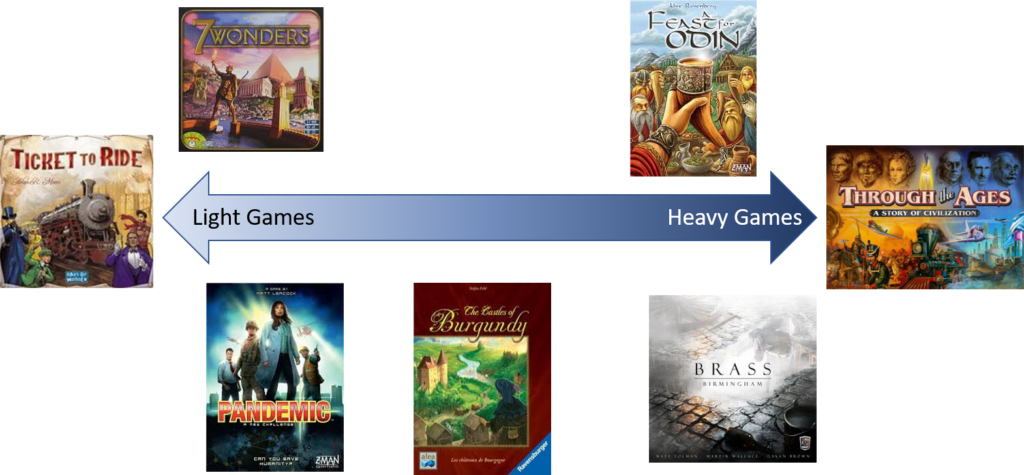We might use a lot of terms in our posts, so we put together a quick guide of some we've used so far.
Here’s how we define some popular game types that we might reference in our posts. We’ll include tags on each game review post with what we consider to be the type of game.
Types of Games
- Euro Games: Short for “European” referencing to origin of this type of game from Germany. Euro games typically involve heavy strategy, complex rules, and little to no luck. Usually Euros don’t have much player conflict or attack mechanisms.
- Our take: we LOVE Euro games and tend to prefer the medium or heavy Euros (see below for weight). The tough part as parents of young kids is that these games often require a lot of focus and while some can be quick, many take at least an hour to play, even 2-player!
- Example: Catan is considered the original and probably still the most broadly popular Euro game

- Thematic Games: These are usually more immersive in the subject and tend to be very interactive, often with players attacking one another or the game. They can involve a high level of luck via rolling dice and are less dependent on strategy or planning.
- Our take: we do like some thematic games, but we shy away from games with too much luck involved. If we have no control over the outcome of a game (i.e. winning is completely dependent on dice rolls), the most likely end-game outcome is table-flipping and brooding.
- Example: Betrayal at the House on the Hill is a popular thematic game where players unfold a story as they journey through a haunted house.
- Abstract Games: These are games that are considered to be mostly lacking in theme and have perfect, or near perfect, information available to all players. That is, there is not typically hidden money, goals, game components, etc. Traditionally, abstract games are easy to learn but difficult to master. Most often abstract games are 2 player games exclusively.
- Our Take: We once thought we didn’t like abstract games, but several games have completely changed our minds. We love how quick, yet challenging many of these games can be. Modern abstract games like Azul and Sagrada also can have beautiful artwork that just make us happy.
- Example: Chess is considered an abstract. All components and movements are visible to all players. Modern abstract games like Azul might move a bit away from the traditional definition with loosely applied themes.
- Cooperative Games (Co-op): All players work together playing against the game. Everyone wins or loses together.
- Our take: There are certain co-op games we love, others we didn’t love so much. A problem we have is that many co-op games are heavily reliant on luck, which we mentioned above is a surefire way to incite fury in one or both of us.
- Example: Pandemic is one of the most well known cooperative games in which players work together to stop disease from spreading across the world. This game hits a little too close to home for us these days.
- Semi-Cooperative Games: In this type of game, most of the players are working together to play against one player. This can be done in a number of different ways and some of them overlap:
- “One vs many” games where one player is set against a group of players working cooperatively
- Example: Descent
- “One vs many” games where one player is set against a group of players working cooperatively
- “Traitor” where one or more players secretly turns on a group that had been working together
- Example: Betrayal at the House on the Hill (usually)
- “Secret Agenda” where players are all working together on the surface, but have a hidden goal that determines whether they individually win or lose
- Example: Dead of Winter (can also have traitors)
- Our Take: Like co-op games, we love some of these games and could live without others. Most are situational, with the right group of people, semi-cooperative games can be a blast, especially the “traitor” games. Nothing better than fostering suspicion among your closest friends and then stabbing them in the back!
- “Traitor” where one or more players secretly turns on a group that had been working together

Miscellaneous Gaming Terms
Here are some we’ve used in recent posts. For more terms, visit our glossary.

- Analysis Paralysis (AP): You’ve been staring at the board for fifteen minutes, your wife is throwing popcorn at your head to move you along, but you know there’s a better move if only you can find it. This may be accompanied by actual productive strategizing, but could just as likely involve panicked staring at the board in a trance-like state just hoping brilliance comes to you. It definitely involves everyone yelling at you to please take your turn.
- Game Weight: used to further describe the type of game. Weight is often applied to Euro games, but can be used to describe any type of game. The heavy/medium/light descriptions of any given game may vary wildly depending on the players. Board Game Geek (BGG) has a universal definition of game weights that are used in the site’s rating scale.

- A heavy game involves complex decision making, long-term planning and strategy, and is very unforgiving of mistakes. If your head hurts and/or the box is literally heavy (lookin’ at you, Feast for Odin), it’s probably a heavy game.
- Examples (According to us): Through the Ages, Feast for Odin, Kanban
- A light game is often viewed as more casual and approachable, with fewer decisions to make. A lightweight game usually has fewer, more straightforward rules and might be faster to play.
- Examples (According to us): Ticket to Ride, Catan, Pandemic
- A medium or mid-weight game is somewhere between the two.
- Examples (According to us): Castles of Burgundy, 7 Wonders, Wingspan
- A heavy game involves complex decision making, long-term planning and strategy, and is very unforgiving of mistakes. If your head hurts and/or the box is literally heavy (lookin’ at you, Feast for Odin), it’s probably a heavy game.
